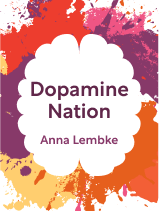

This article is an excerpt from the Shortform book guide to "Dopamine Nation" by Anna Lembke. Shortform has the world's best summaries and analyses of books you should be reading.
Like this article? Sign up for a free trial here.
Want to know how to feel more satisfied with life? Why do people turn to overindulgence when they’re bored or unhappy? What advice do psychologists offer?
Anna Lembke wrote her self-help book, Dopamine Nation, to introduce readers to the concept and consequences of overindulgence and abundance in society. According to her, you can live a more satisfying life by breaking overindulgent habits and forming truly satisfying habits instead.
Keep reading to learn how to feel more satisfied with life, based on Lembke’s advice.
Lembke on Feeling More Satisfied With Life
People often find their own lives boring, and so they turn to overindulgence to make their lives more interesting and forget feelings of dissatisfaction. Bestselling author and Stanford University psychiatrist Anna Lembke’s solution is to discover something new and enriching in your life—something you may have previously overlooked. To find out how to feel more satisfied with life, she explains that you should break habits of overindulgence while also finding a new hobby or outlet for your passions that will help you take more interest in your own life.
Overcome Boredom
Lembke writes that people often fall into patterns of overindulgence because they find their lives unsatisfying and boring. Here we’ll discuss how the root causes of boredom take hold and the four activities psychologists recommend to feel more satisfied with life.
Many writers have attempted to create a definition of boredom. In A Theory of Fun for Game Design, Raph Koster describes boredom as the opposite of learning. You are bored when you aren’t receiving new information to reinforce new habits or ways of being. Brené Brown (Atlas of the Heart) describes boredom as wanting to do something fulfilling but not being able to—a sense of being cut off from purpose. Finally, in Atomic Habits, James Clear defines boredom as the state when you are no longer challenged or excited by the things you’re doing.
To defeat boredom, you’ll want to seek challenges, learn continuously, and do something you consider meaningful and important. In teaching people how to feel more satisfied with life, psychologists recommend four specific courses of action you can take to align your life with these factors and find enrichment.
1. Volunteer. Find opportunities in your community to help people out. Many find it fulfilling to know that they are helping others, and this could provide you with a sense of meaning and purpose you were missing.
2. Start a new project. Taking on a long-term project could provide a sense of challenge that may have been missing. You might take on the challenge of remodeling your kitchen, or set a goal to read one book every week.
3. Learn something new. You can stimulate your mind and challenge yourself by making an effort to learn. Try learning a new language, taking a cooking class, or reading a book on something you know little about.
4. Express yourself. Seek out a way to challenge yourself while gaining a sense of meaning and purpose as you share your feelings and story with others. Try finding a creative outlet like music, visual art, or creative writing.
Find a Supportive Community
Lembke also notes that you can find more satisfaction in life by seeking out a supportive community. She says that you need a listener who accepts you, no matter what you share. Finding the right listener is vital: Some people may be put off by your disclosures, and sharing with someone who rejects you will only deepen your feelings of shame and discourage future disclosures.
If the people around you don’t accept you and your struggles, you may need to seek out new relationships. Fortunately, there are support groups specifically designed to help those who compulsively overindulge, such as Alcoholics Anonymous and Narcotics Anonymous. These communities are full of people who share your struggle and want to learn how to feel more satisfied with life, too. Therefore, they won’t judge you and will have tried and true advice for changing your patterns of behavior. These communities also provide accountability, because you will be expected to share if you find yourself falling back into patterns of overindulgence.
| How to Minimize the Impact of Rejection Lembke stresses that rejection can deepen your pain and leave you feeling isolated. However, you can minimize the pain of rejection if you can respond to it in a healthy, resilient way. If rejection doesn’t hurt you, it won’t discourage future disclosure or cause further isolation. In The Subtle Art of Not Giving a F*ck, Mark Manson writes that handling rejection is an essential social skill. The better people are at hearing and saying no, the stronger their relationships will become because they will feel less need for superficial acceptance. Psychologists recommend three steps for handling rejection. 1. Acknowledge your pain and let yourself grieve. Feeling rejected hurts. Recognize your feelings and let yourself process. 2. Don’t put the blame on yourself. If you’re rejected, it’s easy to assume it’s because there’s something wrong with you. There are many reasons someone might reject you—many of them having more to do with them than with you. 3. Take this as an opportunity to practice resiliency. If you frame your experience as an opportunity to practice processing and recovering from rejection, you may see it in a more positive light and therefore be more accepting of it. |
Should Everyone Attend Support Groups?
On the surface, Lembke’s advice about how to feel more satisfied with life by finding a support group may not seem applicable to everyone. However, Lembke’s thesis throughout her book, Dopamine Nation, is that the solutions that help addicts can teach everyone about controlling milder forms of overindulgence and feeling more satisfied with life. Here, we’ll talk about some of the benefits support groups provide, and how you might find these benefits through your “everyday” relationships.
1. Non-judgmental listening: One of the core benefits of support groups is that you can feel heard without feeling judged. Try talking to your friends and family about your attempts to overcome overindulgence. See if any of them really make you feel heard.
2. Accountability: Support groups keep you accountable. Having to admit to others when you falter creates a strong incentive to change your habits. Try creating accountability by making an agreement with someone you trust that you’ll disclose when you fall short of changing your habits.
3. Advice: Support groups allow you to benefit from the wisdom of people who have already made a lot of progress in changing their habits. Try seeking out someone in your social circle or online community who has already overcome a similar form of overindulgence.
4. Encouragement: Lastly, support groups provide motivating encouragement and positive reinforcement for your success. As you talk to friends and family, see if you can find someone who is rooting for you to change your patterns of overindulgence—spending more time with them will help keep you motivated.

———End of Preview———
Like what you just read? Read the rest of the world's best book summary and analysis of Anna Lembke's "Dopamine Nation" at Shortform.
Here's what you'll find in our full Dopamine Nation summary:
- What causes addictive behaviors and how to take back control
- How pleasure and pain motivate you to consume
- Strategies for keeping your brain’s natural chemicals in balance






